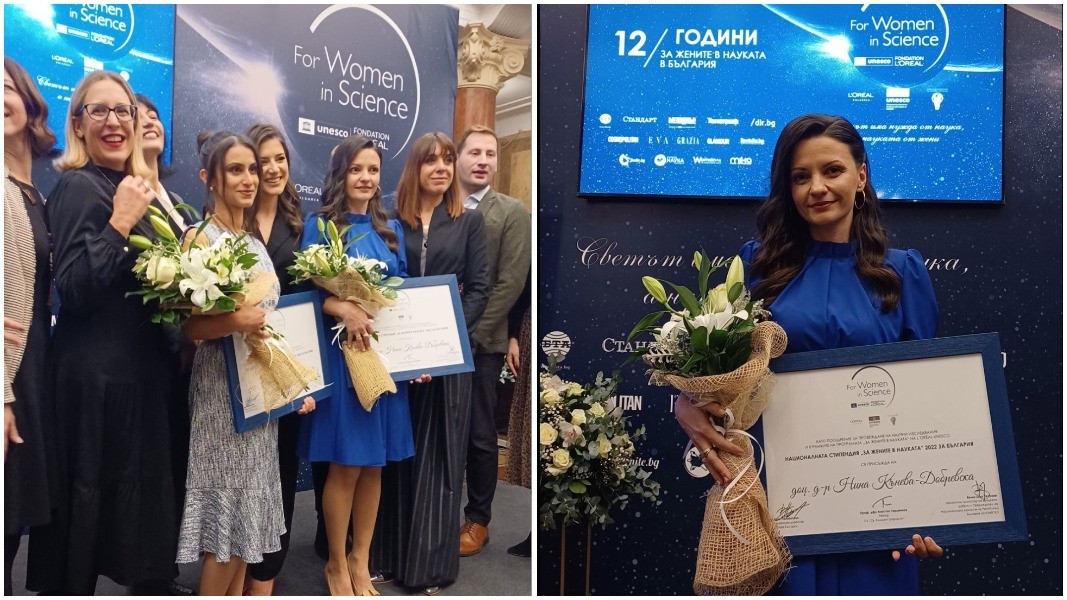Twelve million people in the world die every year of diseases transmitted through drinking water, and their numbers have been growing. That is why science faces the challenge of how to neutralize the new pollutants in the most efficient way possible. One of the scientists working on this problem is a young lady from Bulgaria – Dr. Nina Kaneva-Dobrevska, who recently won a “For women in science” award of a leading world cosmetic company and a UNESCO scholarship.
In her scientific work, Nina Kaneva focuses on water purity – one of the global problems on which our survival as a biological species depends. Her project on “water purification of pharmaceutical contaminants” impressed the jury and she won a USD 5,000 scholarship. The researcher is a member of the department of Inorganic Chemistry at the faculty of Chemistry and Pharmacy at the St. Kliment Ohridski University in Sofia.
“The problem is a pressing one, it is global and it is connected with the existence of the human race,” Nina Kaneva says. “The air is more and more polluted with gases, the water – with toxic substances that are harmful to the health of animals and humans. The World Health Organization report shows that many diseases are connected with drinking contaminated waters, and the number of regions affected increases every time.”
One of the newly emerging water pollutants are pharmaceutical drugs – active compounds with different functions and characteristics which inflict harm at every level of the biological hierarchy. However, waste water treatment plants cannot break them down, and they make their way into the water, albeit in low concentrations. “This is where photocatalysts come in, like titanium dioxide and zinc oxide, which help turn the toxic pollutants into harmless substances,” she adds. What she aimed to do is, with their help, was “to eliminate, to the maximum, everything impeding the full mineralization of pharmaceutical drugs and to obtain clean water.”
Behind the “inscrutable”, emotionless chemical formulas, years ago, Nina Kaneva, then in the 7th grade, discovered an infinite world of secrets and possibilities, which she gradually made her own while at the National Secondary School of Natural Sciences and Mathematics and then the St. Kliment Ohridski University in Sofia, and while specializing in Czechia, Japan and Israel, at her workplace which was to become her home from home.

“In 2007, when I was in the first year of my bachelor’s degree I was fortunate enough to be able to work at the Laboratory of Nanoparticles Science and Technology with the late Assoc. Prof. Tsetso Dushkin, an incredible scientist and person,” she remembers. “He assigned me my first project connected with malachite green dye used to eradicate bacteria in fish tanks which later turned out to be carcinogenic. Interestingly, granofurin, once used to treat a sore throat contained this dye. This laboratory gave the start to so many things for me – project after project, study after study, and a huge amount of love for what I have been doing for 15 years now.”
And though she has been invited to work in different countries, Nina has chosen to remain and pursue her professional career in Bulgaria: “I stayed here because I love my country and Bulgarian folklore. It is a country that has a lot to give to young scientists.” She has opened the doors of her laboratory to encourage talented young people to engage in science, in the same way that she was encouraged by her own mentors.
“I have a second-year student doing chemistry working with me right now,” Nina Kaneva says. “Very talented, very smart, intelligent, I really admire her because even at her age she has so many ideas. I shall personally do everything I can to implement them so she will choose to remain in Bulgaria.”
Just like Nina herself who says she has made all her dreams come true. Today, Nina is the mother of a little girl, she is an associate professor, and she has won a “For women in science” scholarship. “But behind all of these dreams there have been a great many hurdles, many sleepless nights, many failed experiments, 77 scientific articles, around 100 participations in science conferences,” she admits. Asked whether she doesn’t have another dream to pursue, she simply says: “I am too happy to be thinking about anything like that.”
More about this year’s “For women in Science” scholarships
I come to Bulgaria to recharge myself with new feelings - this is what Desislava Tsvetkova shares with us. She spent 14 years in the capitals of the United Europe, working in the administration of the European Commission . Desislava has recently been..
Anita Ekenova, from Lyon, received the “Bulgarian Woman of the Year – St. Zlata of Meglen” award for 2024 at a ceremony organised by the Executive Agency for Bulgarians Abroad (EABA) in Sofia. Ten years ago, Anita and her folk group Ot..
Anton-Constantin Anastassov is presenting his exhibition "Corridor" at the Sofia gallery Jenifer Artemis Art Gallery , which was opened on October 4. Unburdened by the mental clichés of older generations, he gives free rein to insights born in dreams or..

+359 2 9336 661
